ICC Men’s Cricket World Cup Controversies – Part 2
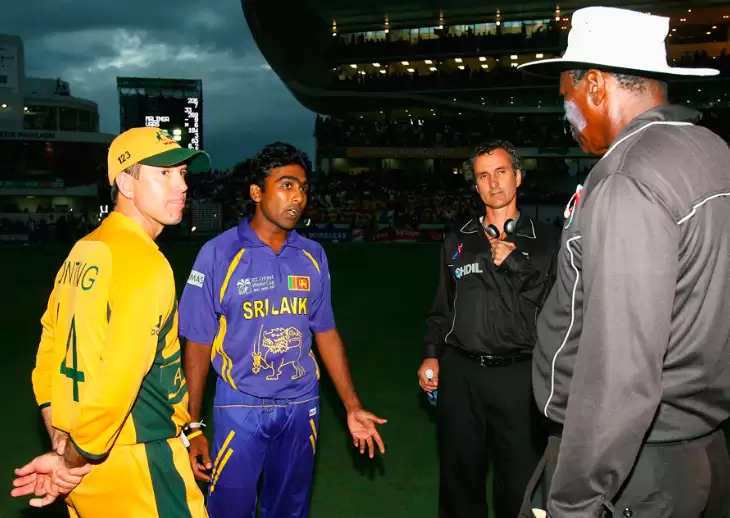

The Cricket World Cup is one tournament that grabs the attention of the world, makes them sit up and take notice. It is certainly the biggest white-ball event in cricket history.
There’s a lot of buzz around as the 2019 World Cup is just a couple of weeks away. Hence, as we build up to the World Cup, we look back at some of the biggest controversies to have rocked cricket in the World Cups.
Here is Part 2 of the famous World Cup controversies.
Bob Woolmer’s death in 2007
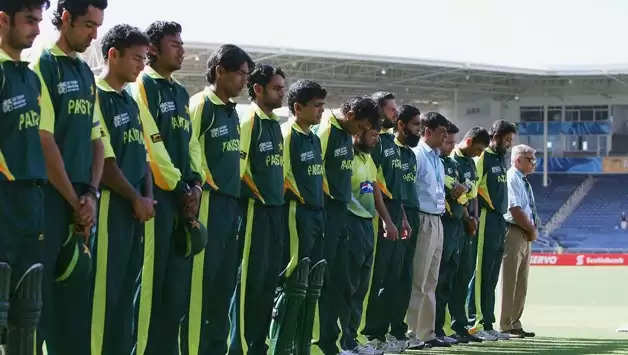
The 2007 World Cup was one of the worst campaigns for Pakistan. They were knocked out in the group stage only as they lost to West Indies and Ireland in their first two games. Their loss to West Indies wasn’t surprising but their defeat to Ireland shocked the world. It propelled the Irish team to qualify for the Super Eights.

However, their loss to Ireland wasn’t the only low point. A day after that game, their head coach Bob Woolmer was found in the bathroom of his hotel room in Kingston. There were various rumours. His death was made public by Pakistan’s media manager back then, Pervez Mir. Woolmer was diabetic and it was alleged that there was blood and vomit all around him and his room when he was found dead.
Hence, there were rumours that it may have been a heart attack. But there were also allegations that it might’ve been a murder or even a suicide wasn’t ruled out.
Pakistan played their final game of that 2007 World Cup against Zimbabwe and won comprehensively, dedicating the win to their coach who passed away just a few days ago. A day after that win, it was announced that Woolmer was murdered but the air of uncertainty still remained. A couple of months later, after all the investigation, Jamaican Constabulary Force announced that Woolmer died due to natural (health) reasons.
Andrew Flintoff stripped of vice-captaincy – 2007
Drinking, late-night partying and staying out till the early hours of the next day is nothing new in England cricket. Ben Stokes and Alex Hales were the most recent to do it.
Andrew Flintoff’s episode during the 2007 World Cup is another famous such incident. The then premier England all-rounder was dropped for a game against Canada in the group stages of the 2007 World Cup. The reason for his omission was he was out drinking marathon with five of his other teammates in St Lucia. James Anderson, Ian Bell, Paul Nixon Liam Plunkett and Jon Lewis were the other players who were with Flintoff partying. All six players were fined and four of them played (barring Lewis) the game against Canada but it was Flintoff who had to bear the brunt of big repercussions.
Flintoff was stripped from the role of the vice-captain for the World Cup. The all-rounder was given several warnings earlier as well, according to coach Duncan Fletcher. However, Flintoff missed just one game as he returned for England’s final group stage fixture against Kenya.
Darkness in the 2007 World Cup final
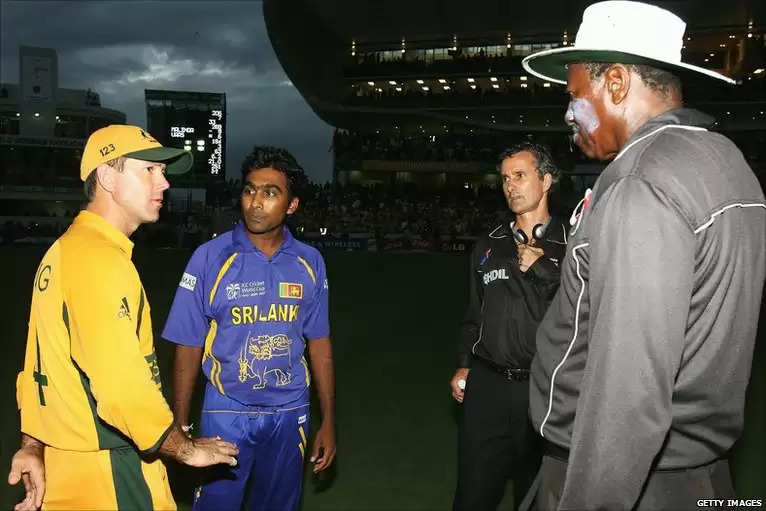
The 2007 edition of the World Cup was heavily criticised for its awful organisation. Ticket prices touched the roof of stadiums which led to empty stands. The organisers behaved unprofessionally throughout the tournament and all in all, it was badly organised.
However, the umpires and other match officials hogged the limelight in the final with some of the most ridiculous calls on the playing conditions. Australia batted first in a rain-curtailed game. Adam Gilchrist’s blazing 149 took the Aussies to 281/4 in 38 overs.
Sri Lanka started their chase. Sanath Jayasuriya and Kumar Sangakkara scored fifties but the target seemed to far away. It was more than a competitive score for a 50-over game as well. Once the two senior batsmen were dismissed, the Sri Lankan side kept losing wickets and it came to a point where they were just going through the motions.
The light kept deteriorating as the game progressed. At the end of the 33rd over, the umpires offered the light to the Sri Lankan batsmen and they accepted it. They were ready to walk off and the Australian team was celebrating. However, umpire Aleem Dar walked up to Ricky Ponting and said that the game isn’t over yet.
Five minutes later, Dar was insisting that the play needs to go on and the 30-yard circle which was removed was put back in with the help of a torch. It was as dark as it could get. The play went on for three more overs before it was called off. It was one of the most bizarre scenes ever seen in a World Cup game.
Australia lifted the World Cup trophy for the third successive time but the moon was out by then. However, in the aftermath of this decision, all five match officials (Steve Bucknor and Aleem Dar – onfield umpires; Rudi Koertzen and Billy Bowden – the reserve umpires; and Jeff Crowe – the match referee) were banned for the subsequent ICC event which was the maiden T20 World Cup in South Africa later that year.
2.5m rule and Ian Bell’s controversial LBW decision in 2011
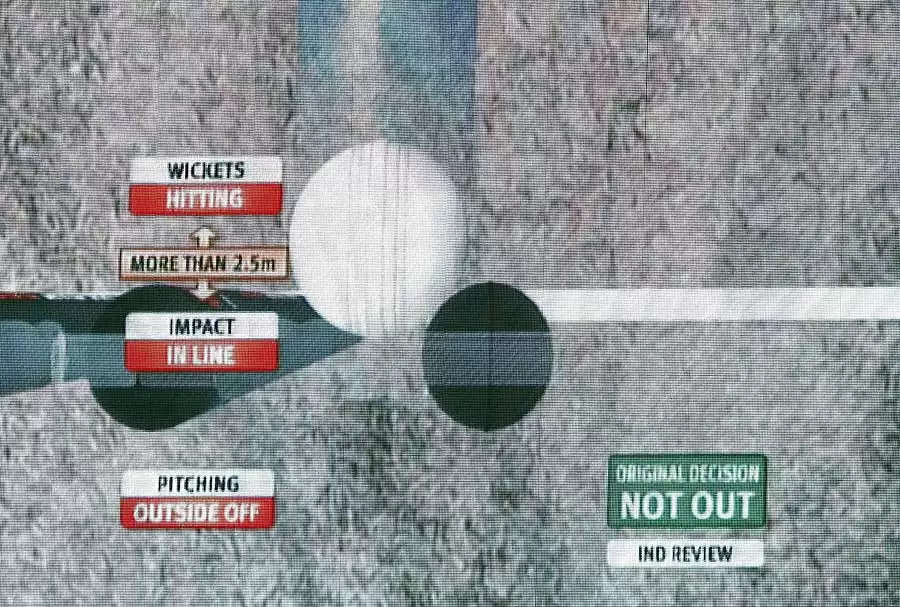
It’s not often you see a raging MS Dhoni. But the incident was such that it needed some addressing. The India-England game in the 2011 edition was one of the best in the World Cup history. There were some terrific performances from both sides but it was one decision that took away part of the limelight.
The Umpire Decision Review System was in place for the first time in World Cup history in 2011 and it came into the spotlight straight away. Ian Bell was rapped on the pads by Yuvraj Singh. Umpire Billy Bowden ruled it not out. On referral, it was seen that the ball-tracking showed three reds which meant Bell was out. However, the Bowden’s decision of not out was upheld as Bell was too far down the track (more than 2.5 metres).
Hence, Bell survived and continued his innings. He was batting on 17 at that point and went on to make 69 which made a big impact on the game.
Dhoni wasn’t pleased one bit with the decision. There was nothing on the field or against the umpires but Dhoni lashed out in a press conference. “The adulteration of technology with human thinking meant we didn’t get that (Bell) wicket. If Hawkeye says it’s good and going to hit middle stump, I see no reason why the distance matters,” Dhoni was quoted saying.
There was uncertainty throughout that World Cup with the 2.5-metre rule. The ICC tweaked the law a bit midway through the tournament by giving the on-field umpires the discretion to deem it out even if the batsman is more than 2.5 metres down the pitch and the ball was hitting any part of the middle stump as suggested by hawk-eye.
There were two instances of such decisions being overturned. Hence, it led to a lot of confusion and it resulted in India not opting for DRS for a long time.
Two tosses in the 2011 World Cup final
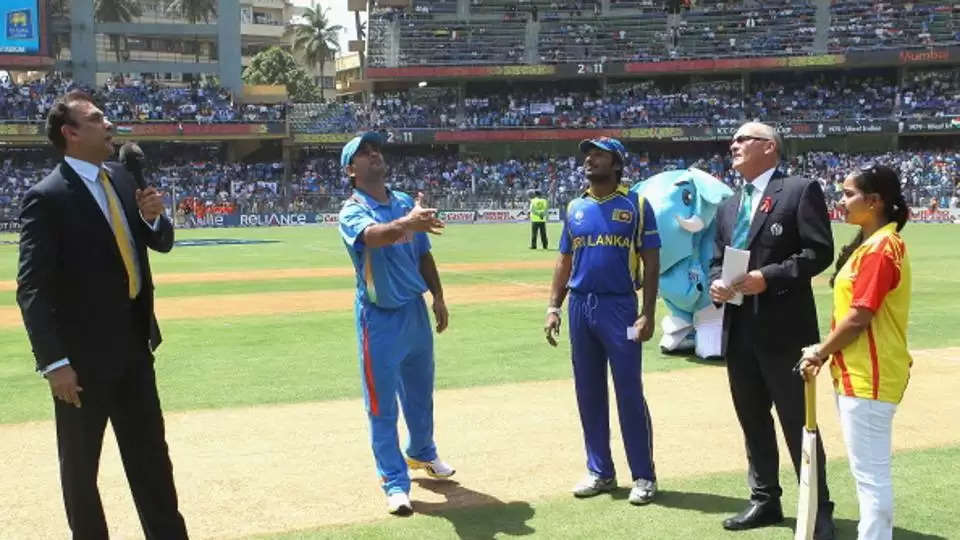
The 2011 World Cup Final will be remembered for a lot of reasons. India lifted the cup after 28 years, Mahela Jayawardene scored a brilliant ton, Gautam Gambhir’s 97 set the stage for the run-chase and MS Dhoni was the superstar of the night with his unbeaten 91.
However, there was one moment that may not be remembered but was a significant one in the context of the game. Even before the first ball was bowled, there was an air of confusion. The coin toss happened twice as match referee Jeff Crowe couldn’t hear Kumar Sangakkara’s call. When Dhoni flipped the coin for the first time, it had turned up to be heads according to Ravi Shastri who was hosting the toss.
However, that was scrapped as Crowe couldn’t hear the Sri Lankan skipper with 33,000-plus fans cheering at the Wankhede stadium. There was a brief conversation before Dhoni flipped the coin again and this time, Sangakkara was loud and clear and it fell in his favour as well. Sri Lanka batted first in the big final but India managed to lift the trophy in the end.
Umpiring error to strand James Taylor on 98 in 2015
Umpiring mistakes are a part and parcel of the game but in the opening game of the 2015 World Cup, it cost James Taylor his maiden century. It did not have any impact on the outcome of the game but a personal milestone for a player was denied.
Australia scored 342 batting first and in reply, England couldn’t get going and were 231 when the last man, James Anderson walked out. James Taylor was batting on 98 when he was struck on the pads and the umpire raised his finger. Taylor reviewed successfully but Anderson had set off for a run and was out at the striker’s end.
Anderson was ruled runout but the law states that once the umpire gives his decision, the ball is deemed dead and no runs or wickets are further possible. However, that wasn’t followed and it cost James Taylor his maiden ODI century.
The Rohit Sharma no-ball in the quarterfinal in 2015
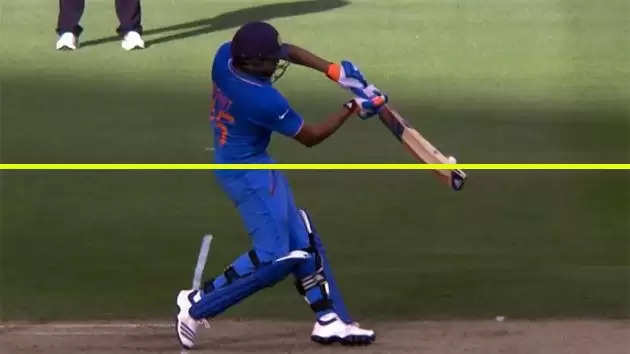
The India-Bangladesh rivalry has stirred up quite a bit in the last few years. And it all began in the quarterfinal of the 2015 World Cup. Bangladesh had stunned the world when they qualified for the knockouts. They had beaten India in the 2007 edition as well and were looking for an encore.
The start was great for the Bangla boys as they had India at 115/3 in 28 overs. Rohit Sharma was still batting and along with Suresh Raina, he led India’s recovery. Then came a huge moment in the 40th over. Batting on 90, Rohit holed out at deep square-leg off a waist-high full-toss off Rubel Hossain. The fiery pacer had already picked up Virat Kohli earlier and here, almost had Rohit as well.
On replays, the no-ball call seemed very marginal but the confidence of the on-field umpires was the one to see. They did not feel the need to go upstairs to the third umpire and it proved to be a big moment in the game. Rohit accelerated from that point and scored 137 helping India get to 302 and eventually, win the game.
There was a massive outrage from the fans and also the then ICC president Mustafa Kamal who blasted out at the poor umpiring. He put the issue forward in the ICC meeting as well but the case was shut as it was a marginal 50-50 call.
South Africa’s alleged political decision in the 2015 semi-final
The semi-final of the 2015 World Cup was one of the most emotional moments for the South African cricketers. They had recently won their first knockout game in World Cup cricket when they beat Sri Lanka in the quarterfinal. In the semis, New Zealand beat them in a thrilling game to advance to the final and end South Africa’s dream.
It was another loss in a knockout game, it was another knockout game which they should’ve won. However, there was some bit of controversy that surrounded South African cricket after that. It was alleged that Vernon Philander who was not in the XI in the quarterfinal was a forcibly last-minute change for the semi-final. The quota for fielding players of colour was scrapped back in 2007. Yet, South Africa at that time maintained a norm of fielding four players of colour.
South Africa’s high-performance coach Mike Horn had revealed that politics had a big say in the final XI that took field in the semi-final. Kyle Abbot had taken nine wickets in four games and was one of the in-form bowlers. However, he was dropped for Philander and the debate on ‘players of colour’ resurfaced.
Philander had a disappointing outing as he conceded 52 runs in the 8 overs he bowled and didn’t pick up a wicket either. The CSA president Chris Nenzani back then denied such allegations that the board members pressurized the team to change the XI last-minute.

